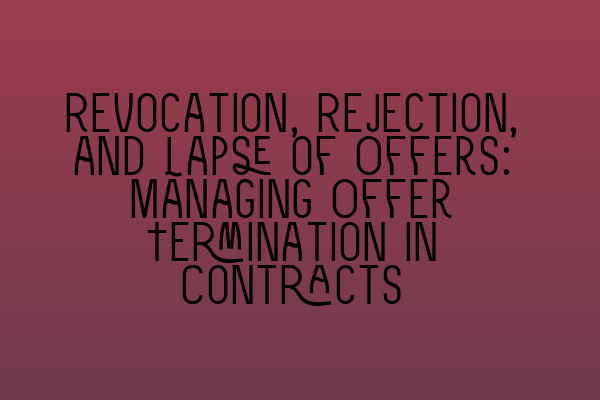Revocation, Rejection, and Lapse of Offers: Managing Offer Termination in Contracts
In the world of contract law, offers play a crucial role in initiating the formation of a legally binding agreement. An offer is a proposal made by one party to another, expressing an intention to enter into a contract on specific terms. However, it is important to understand that offers are not indefinitely binding and can be terminated in certain circumstances. In this article, we will explore the concepts of revocation, rejection, and lapse of offers, and the strategies to effectively manage offer termination in contracts.
1. Revocation of Offers:
Revocation refers to the act of withdrawing or canceling an offer before it is accepted. The general rule is that an offeror has the power to revoke their offer at any time before acceptance. However, the revocation must be communicated to the offeree in order for it to be effective. This means that the offeree must have actual knowledge of the revocation, either through direct communication from the offeror or by a reliable third party. It is recommended to revoke offers in writing to ensure clarity, although oral revocations may also be valid in certain circumstances.
To learn more about SQE Contract Law, visit SQE 1 Practice Exam Questions.
2. Rejection of Offers:
Rejection occurs when the offeree clearly and unequivocally communicates their refusal to accept the offer. Unlike revocation, rejection does not need to be communicated directly to the offeror and can be made through any reasonable means. Once the offer has been rejected, it ceases to exist and cannot be accepted at a later time. It is worth noting that a counteroffer is considered a rejection of the original offer and acts as a new offer, requiring acceptance from the original offeror.
For practice exams on offer termination and other contract law topics, check out SQE 1 Practice Mocks FLK1 FLK2.
3. Lapse of Offers:
An offer may also be terminated through the lapse of time. A lapse of an offer occurs when a specific period of time specified in the offer passes without acceptance by the offeree. Alternatively, if no time limit is specified, an offer may also lapse after a reasonable period of time has elapsed. The determination of a reasonable period of time will depend on the nature of the offer and the circumstances surrounding it. It is important to note that an offer that has lapsed cannot be accepted by the offeree.
For comprehensive preparation courses on contract law, including offer termination, consider enrolling in SQE 2 Preparation Courses.
Managing Offer Termination:
To effectively manage offer termination in contracts, it is essential to adhere to the following strategies:
(a) Clear Communication: Both offerors and offerees should ensure that their intentions and actions are communicated clearly and unambiguously. This includes promptly notifying the other party of any revocations, rejections, or lapses of offers.
(b) Document Everything: It is advisable to document all communications and actions related to offers and offer termination. This will serve as a reliable record in case of any disputes that may arise.
(c) Timeliness: Parties should be mindful of time limits specified in offers and act promptly. Failure to do so may result in the offer lapsing or being revoked.
For reliable preparation courses on offer termination and other contract law subjects, explore SQE 1 Preparation Courses.
In conclusion, understanding and effectively managing the termination of offers is crucial in contract law. By familiarizing oneself with the concepts of revocation, rejection, and lapse of offers, as well as implementing strategies to manage offer termination, parties can navigate the complexities of contract formation with confidence.
Stay up to date with the latest SRA SQE exam dates at SRA SQE Exam Dates.
Disclaimer: The information provided in this article is for general informational purposes only and should not be construed as legal advice. Consult with a qualified solicitor for advice on your specific legal situation.
